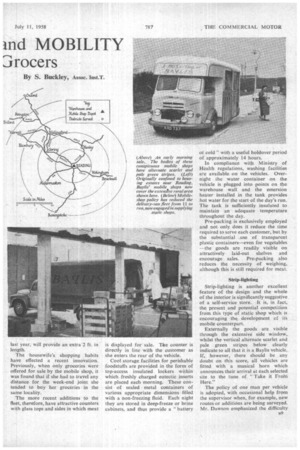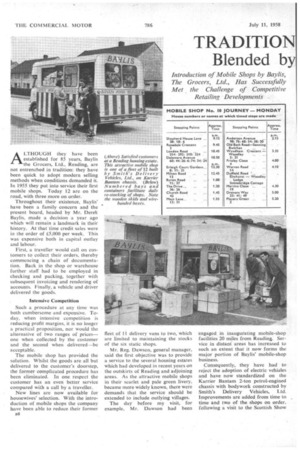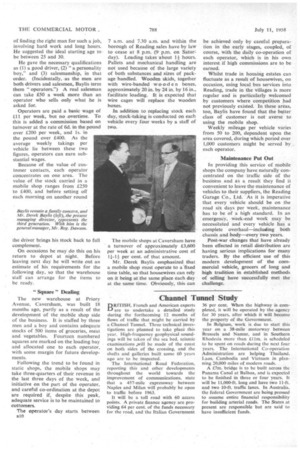By S. Buckley, Assoc. - Ittst.T.
Page 43

Page 42

Page 44

If you've noticed an error in this article please click here to report it so we can fix it.
ALTHOUGH they have been established for 85 years, Baylis the Grocers, Ltd., Reading, are not entrenched in tradition: they have been quick to adopt modern selling methods when conditions demanded it. In 1955 they put into service their first mobile shops. Today 12 are on the road, with three more on order.
Throughout their existence, Baylis' have been a family concern and the present board, headed by Mr. Derek Baylis, made a decision a year ago which will remain a landmark in their history. At that time credit sales were in the order of £5,000 per week. This was expensive both in .capital outlay and labour.
First, a traveller would call on customers to collect their orders, thereby commencing a chain of documentation. Back in the shop or warehouse further staff had to be employed in checking and packing, together with subsequent invoicing and rendering of accounts. Finally, a vehicle and driver delivered the goods.
Intensive Competition Such a procedure at any time was both cumbersome and expensive. Today, when intensive competition is reducing profit margins, it is no longer a practical proposition, nor would the alternative of two ranges of prices— one when collected by the customer and the second when delivered—be acceptable.
The mobile shop has provided the solution. Whilst the goods are all but delivered to the customer's doorstep, the former complicated procedure has been eliminated. In one respect the customer has an even better service compared with a call by a traveller..
New lines are now available for housewives' selection. With the introduction of mobile shops the company have been able to reduce their former n8 fleet of I I delivery vans to two, which are limited to maintaining the stocks of the six static shops.
Mr. Reg. Dawson, general manager, said the first objective was to provide a service to the several housing estates which had developed in recent years on the outskirts of Reading and adjoining areas. As the attractive mobile shops in their scarlet and pale green livery, became more widely known, there were demands that the service should be extended to include outlying villages.
The day before my visit, for example, Mr. Dawson had been engaged in inaugurating mobile-shop facilities 20 miles from Reading. Service in distant areas has increased to such an extent that it now forms the major portion of Baylis' mobile-shop business.
Consequently, they have had to reject the adoption of electric vehiqles and have now standardized on the Karrier Bantam 2-ton petrol-engined chassis with bodywork constructed by Smith's Delivery Vehicles, Ltd. Improvements are added from time to time and two of the shops on order, following a visit to the Scottish Show last year, will provide an extra 2 ft. in length.
The housewife's shopping habits have effected a recent innovation. Previously, when only groceries were offered for sale by the mobile shop, it was found that if she had to travel any distance for the week-end joint she tended to buy her groceries in the same locality.
The more recent additions to the fleet, therefore, have attractive counters with glass tops and sides in which meat is displayed for sale. The counter is directly in line with the customer as she enters the rear of the vehicle.
Cool storage facilities for perishable foodstuffs-are provided in the form of top-access insulated lockers within which freshly charged eutectic inserts are placed each morning. These consist of sealed metal containers of various appropriate dimensions filled with a non-freezing fluid. Each night they are stored in deep-freeze or brine cabinets, and thus provide a 'battery
of cold" with a useful holdover period of approximately 14 hours.
In compliance with Ministry of Health regulations, washing facilities are available on the vehicles. Overnight the water container on the • vehicle is plugged into points on the warehouse wall and the emersion heater installed in the tank provides hot water for the start of the day's run. The tank is sufficiently insulated to maintain an adequate temperature throughout the day.
Pre-packing is exclusively employed • and not only does it reduce the time required to serve each customer, but by the substantial use of transparent plastic containers—even for vegetables —the goods are readily visible on attractively laid-out shelves and encourage sales. Pre,packing also reduces• the necessity of weighing, although this is still required for meat.
Strip-lighting Strip-lighting is another excellent feature of the design and the whole of the interior is significantly suggestive. of a. self-service store. It is, in fact, the present and potential competition from this type of static shop which. is encouraging the development of its mobile counterpart.
Externally the goods are visible through the extensive side window, whilst the vertical alternate scarlet and pale green stripes below clearly indicate to all that it is a Baylis vehicle. If, however, there should be any doubt on this score, all vehicles are fitted with a musical horn which announces their arrival at each selected site to the tune of "Take it Freifn Here."
The policy of one man per vehicle is adopted, with occasional help from the supervisor when, for example, new routes or additions are being surveyed. Mr. Dawson emphasized the difficulty of finding the right man for such a job, involving hard work and long hours. He suggested the ideal starting age to be between 25 and 30.
He gave the necessary qualifications as (1) a good driver, (2) "a personality boy," and (3) salesmanship, in that order. (Incidentally, •as the men are both drivers and salesmen, Baylis term them " operators.") A real salesman can take £50 a week more than an operator who sells only what he is asked for.
Operators are paid a basic wage of £11 per week, but no overtime. To this is added a commission based on turnover at the rate of 6d. in the pound over £200 per week, and Is. in the pound over L400. As the average weekly takings per vehicle lie between these two figures, operators can earn substantial wages.
Because of the value of customer contacts, each operator concentrates on one area. The value of the stock carried in a mobile shop ranges from £250 to £400, and before setting off each morning on another round the driver brings his stock back to full complement.
On occasions he may .do this on his return to depot at night. Before leaving next day he will write out an estimate of his requirements for the following day, so that the warehouse staff can arrange for the items to be ready.
" Square " Dealing
The new warehouse at Priory Avenue, Caversham, was built 18 months ago, partly as a result of the development of the mobile shop side of the business. It is staffed by three men and a boy and contains adequate stocks of 500 items of groceries, meat and vegetables. Fourteen numbered squares are marked on the loading bay and allocated one to each operator, with some margin for future developments.
Following the trend to be found in static shops, the mobile shops may take three-quarters of their revenue in the last three days of the week, and initiative on the part of the operator, and careful co-ordination at the depot are required if, despite this peak, adequate service is to be maintained to customers.
The operator's day starts between B 1 0
7 a.m. and 7.30 a.m. and within the borough of Reading sales have by law to cease at 8 p.m. (9 p.m. on Saturday). Loading takes about 1+ hours. Pallets and mechanical handling are not used because of the large variety of both substances and sizes of package handled. Wooden skids, together with wire-banded we boxes, approximately 20 in. by 24 in. by 16 in., facilitate loading. It is expected that wire cages will replace the wooden boxes.
In addition to replacing stock each day, stock-taking is conducted on each vehicle every four weeks by a staff of Iwo.
The mobile shops at Caversham have a turnover of approximately £3,600 per week at an administrative cost of 14-1+ per cent. of that amount.
Mr. Derek Baylis emphasized that a mobile shop must operate to a fixed time table, so that housewives can rely on it being at the same place each day at the same time. Obviously, this can be achieved only by carefulpreparation in the early .stages, coupled, of course, with the daily co-operation of each operator, which is in his own interest if high commissions are to be earned.
• Whilst trade in housing estates can fluctuate as a result of housewives,. on occasion, using local bus services into Reading, trade in the villages is more regular and is particularly welcomed by customers where competition had not previously existed. In these areas, too, Baylis have found that the better class of customer is not averse to using the mobile shop.
Weekly mileage per vehicle varies from 50 to 200,. dependent upon the area covered, during which period over 1,000 customers might be served by each operator.
Maintenance Put Out
In providing this service of mobile shops the company have naturally concentrated on the traffic side of the business and as a result they find it convenient to leave the maintenance of vehicles to their suppliers, the Reading Garage Co., Ltd. " As it is imperative that every vehicle should be on the road six days per week, maintenance has to be of a high standard. In an emergency, week-end work may be necessitated and ' every vehicle has a complete overhaul—including both chassis and body—every two years.
Post-war changes that have already been effected in retail :distribution are having serious implications for many traders. By the efficient use of this modern development of the commercial vehicle, grocers of long and high tradition in established methods of selling have .successfully met the challenge.




































































































